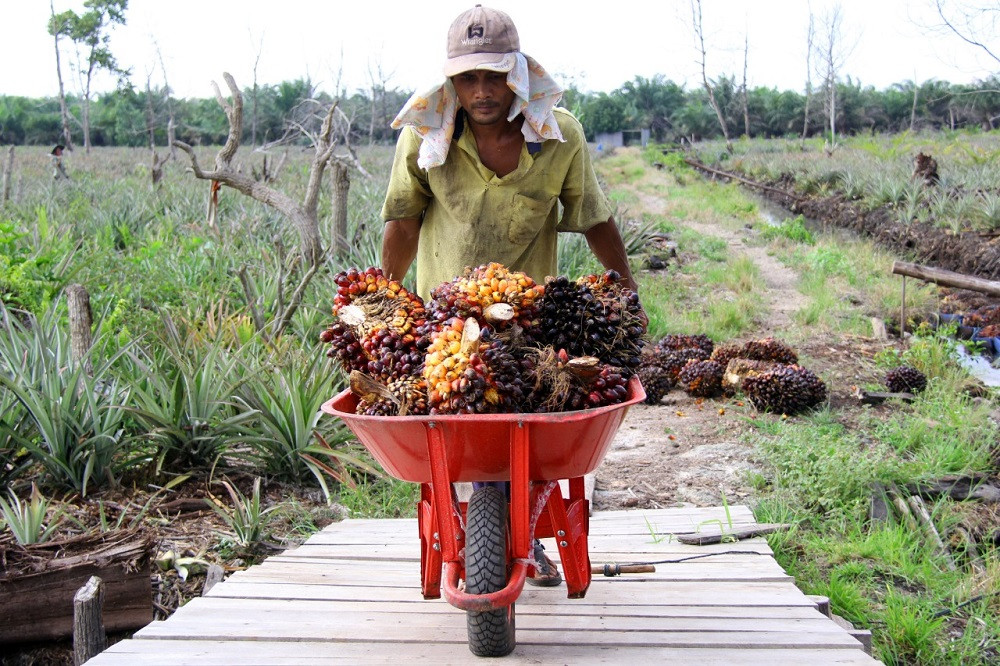Popular Reads
Top Results
Can't find what you're looking for?
View all search resultsPopular Reads
Top Results
Can't find what you're looking for?
View all search resultsCan European Union adapt to a new palm reality?
The success of the moratorium cannot be overstated; deforestation in Indonesia is at an all-time low.
Change text size
Gift Premium Articles
to Anyone
F
ollowing the United Kingdom’s positive moves on palm oil, the upcoming ASEAN-European Union meeting in Jakarta is a test for Brussels’s commitment to sustainable development.
ASEAN and the EU will regroup on Wednesday and Thursday for the second meeting of the Joint Working Group on vegetable oils. The meeting comes on the heels of a decision by Belgium to ban the use of palm-based biofuels in 2022, well ahead of the EU’s 2030 phase-out date under the Renewable Energy Directive (RED).
Although this is within EU rules, it typifies much of what ASEAN’s palm-producing countries are fighting against: insidious regulatory barriers with flimsy justifications.
Why “insidious”? Two weeks ago, the EU ambassador to Indonesia stated in a public forum that there was no ban on palm oil in the EU region.
Contrary to Ambassador Vincent Piket’s claims, the regulatory barriers are real, and they have a real-world impact on agriculture in ASEAN and Indonesia. From the Indonesian producer perspective, we are seeking above all a reduction in regulatory and other barriers, with the following being key.
First is the countervailing duties that have been imposed on Indonesian biofuels. These were introduced immediately after the EU lost a lengthy WTO case for its antidumping duties on the same product.
Second is the discriminatory ban by the EU on palm-based biofuels. This has been explored often in the pages of this newsletter and is currently the subject of a WTO case from Indonesia.
Third are the multiple regulatory proposals that are on the EU’s list that could serve as further barriers to Indonesian agricultural exports. These include the “deforestation regulation”, the “due diligence” plans and the efforts by some, such as Belgium and France, to ban palm oil biofuels completely.
The concern among many in the palm oil community is that the EU will view the Joint Working Group as another “talk shop”; an exercise that simply goes through the motions of diplomacy without providing real and concrete outcomes.
For the Indonesian palm community, real and concrete results are the only currency that matters. The JWG should explore, as one example, a meaningful path forward for the EU to recognize Indonesia Sustainable Palm Oil (ISPO) across multiple agreements and under its regulatory regimes.
ISPO certifies – among other things – legality under Indonesian law. This means adherence to human rights obligations, treatment of workers under the national law as well as International Labor Organization treaties and, importantly, adherence to the Presidential Oil Palm Moratorium.
The success of the moratorium cannot be overstated; deforestation in Indonesia is at an all-time low. More importantly, ISPO is the only clear and realistic path for smallholder certification across the country: Indonesia has 2.3 million smallholders, so this is a very substantial benefit of ISPO.
The UK – which is no longer part of the EU – has shown international leadership by recognizing the potential of ISPO certification. Earlier this month, Indonesian Foreign Minister Retno LP Marsudi and UK Secretary of State Dominic Raab declared a joint path forward on sustainable trade in palm oil.
A joint statement made a commitment to “two-way sustainable trade based on mutual respect of national legislation and mutual understanding of standards and certification.” But, more importantly, it made a clear commitment to ISPO in the UK’s deforestation due diligence requirements for imported commodities: “The due diligence requirements will allow for a pathway to recognize different national standards and certification schemes as evidence of that legal compliance.”
For the Indonesian – as well as ASEAN – palm oil community, there are two key phrases here. They are “mutual respect” and “national standard”. The UK has become acutely aware of the work that has gone into ISPO over almost a decade. The UK also appears to be aware of the direct involvement of the Presidential Office in revising and strengthening ISPO for both environmental and social outcomes, as well as international trade. This is continuous improvement until it meets recognized international standards of sustainability.
The UK government has recognized that Indonesian palm oil is the most certified internationally traded commodity, and that the President’s initiatives on palm oil and deforestation have worked. The EU could also provide such a path toward recognition for ISPO as part of the enhanced relationship that is mutually beneficial.
To date, this positive step has not happened. It is our fervent hope that our European friends acknowledge the importance of this moment and commit to supporting Indonesia – through ISPO – to build on our already-impressive sustainability agenda.
***
Fadhil Hasan is a senior economist at the Institute for Development of Economics and Finance (INDEF) and Musdalifah Mahmud is the deputy to the coordinating economic minister for food and agriculture. The views expressed their own.










